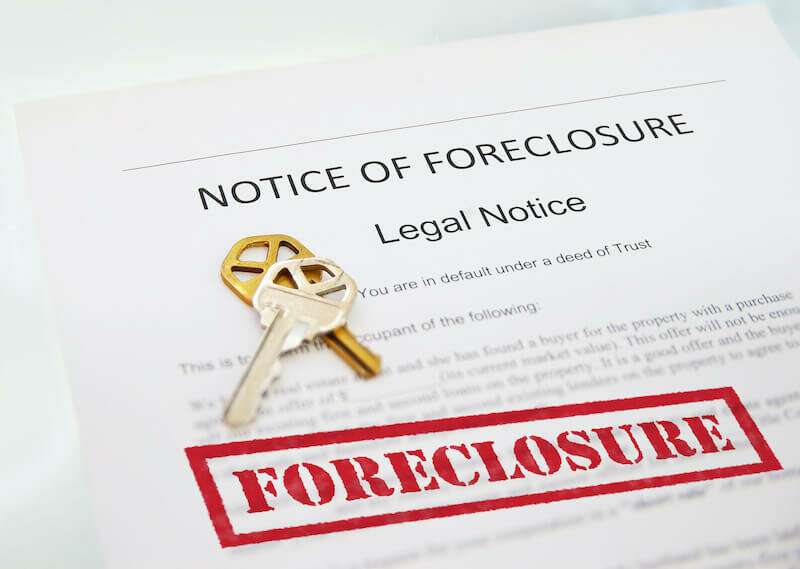Has your lender sent you a notice of default for your Idaho home? Are you having trouble paying off your monthly mortgage payments? If so, you need a better understanding of the foreclosure process in Idaho.
In the guide below, you will learn about an Idaho foreclosure and the foreclosure laws surrounding your difficulty paying off your real estate mortgage loan.
As a borrower, you should understand your rights and what to do about missed payments before facing foreclosure proceedings.
Read on to find out more about the foreclosure process and how to avoid a home foreclosure in Idaho. Let’s get started!

What is the Foreclosure Process in Idaho
First, you will need to learn about the non-judicial foreclosure process in Idaho. The lender is the trustee during a home sale. You can find certain specifications of the sale in the power of sale clause. Without certain specifications, a non-judicial foreclosure can occur if the borrower cannot pay their mortgage payments.
The notice of sale gets filed with the county recorder’s office when a foreclosure begins. Then, the lender notifies the borrower of the notice of sale filing. The lender has to inform the borrower at least 120 days before the pending sale.
Furthermore, in Idaho, the trustee must publish the notice of sale in the county’s newspaper for four straight weeks. Thirty days need to pass between the publication of the notice of sale and the home sale date to the highest bidder.
When they publish the information in a newspaper, it must include the legal description, the property’s address, and the name and telephone number of the go-to person who can offer information about the trustee sale and directions.
The original borrower will have at least 30 days between the newspaper publication and the foreclosure auction to either pay back the loan/missed payments via a lump sum or set up a repayment plan.
If the home foreclosure sale ends up lower than the remaining balance on the mortgage loan, the borrower will need to pay back the rest of the loan. Yet, the lender first needs to file a deficiency judgment within the following three months after the foreclosure sale. The lender cannot seek any money past the remaining balance from the sale and the loan amount.
Step-by-Step Guide for the ID Foreclosure Process
The foreclosure process in every state follows six basic steps. First, payment default takes place when the borrower misses one payment on the mortgage. When a borrower misses a payment, the lender will contact him or her via phone call or letter.
Usually, the borrower needs to pay the monthly mortgage payment on the first of the month. However, lenders usually provide a grace period of 15 days. Once the grace period ends and the borrower didn’t send in the payment, the lender can charge a late fee and then send a missed payment notice.
If two months of missed payments occur, the lender will follow up with a phone call. After three months without a single payment, the lender sends a demand letter. The mortgage is then in default. At that point, a loan modification is possible. Otherwise, the borrower can bring the loan back to good standing or face foreclosure and eviction.
The second step includes a notice of default. After four months of missed payments, the bank or mortgage company sends a notice of default. At that point, borrowers have 30 days to cover missed payments or risk the start of foreclosure.
The third part of the foreclosure process involves recording the notice of sale in the county of the property’s location. A nonjudicial foreclosure moves faster and the lender files all necessary forms to start the foreclosure.
Then, the lender schedules a sale date for the property, and the notice of the trustee’s sale is recorded. The notice of sale must include the date, time, location, and opening bid information.
The fourth step in the foreclosure process includes the public auction. The trustee will calculate the correct opening bid based on the remaining balance from the outstanding loan as well as liens, unpaid property taxes, and other fees for the sale.
The highest bidder will receive the trustee’s deed once the sale is complete. However, if the property is not sold at auction, the lender will work with a realtor or broker, which is the fifth step in foreclosure. At this point, the lender may remove the liens to make the property easier to sell through a realtor. The last step in the foreclosure process is eviction once the home gets sold.
How Does Foreclosure Affect House Selling in ID
You can work with your lender to avoid foreclosure by pursuing a short sale. However, your lender needs to first agree to a short sale. When attempting to sell your home, a short sale involves selling your property at a lower asking price than what’s owed on your mortgage. Upon the sale, the entire payment goes to the lender to cover the mortgage.
A short sale is a much better option than a foreclosure as it does not negatively impact the borrower’s credit rating.
Since the short sale rarely covers the remaining balance on the mortgage, the lender can then either forgive the rest of the payment or pursue a deficiency judgment to get the full balance paid.
A deficiency judgment can impact the borrower’s other assets since the lender can then pursue other belongings to close out the remaining balance, such as a motor vehicle or a trailer. The borrower may lose other real estate property, personal property, wages, and even funds in bank accounts.
Foreclosures also make a large impact on the housing market as a whole. Approximately 2 million houses are undergoing foreclosure. The impact involves a lower selling price of properties due to foreclosure.
For example, in Massachusetts, foreclosed homes sold for 27 percent less than similar properties. In addition, all non-foreclosed properties within a radius of 260 feet had a 1 percent drop in price compared to similar houses farther away. With more foreclosures in a certain area, the housing prices drop even more.

Idaho Foreclosure Laws
This guide to foreclosure laws in Idaho involves the steps that a lender needs to take to ensure borrowers have the opportunity to pay back their missed payments and avoid foreclosure.
Federal mortgage servicing laws require the lender to contact or attempt to contact the borrower via a phone call. The lender then discusses possible options to cover the missed payments, such as:
- A loan modification
- A repayment plan
- Forbearance (extra time to pay off bills)
The contact has to occur within 36 days after a missed payment and every 36 days after future missed payments. The lender also needs to send a letter about loss mitigation strategies no later than 45 days after missing a payment. The information also needs to include who is assigned to the case to help the borrower avoid foreclosure.
However, if borrowers filed for bankruptcy or asked the lender to not contact them, they won’t get these phone calls or letters due to the Fair Debt Collection Practices Act.
In Idaho, lenders are also required to send a breach letter informing the borrower that their loan is in default. The breach letter allows borrowers to stop the default and prevent foreclosure. Furthermore, the lender cannot legally start a foreclosure until 120 days after the first missed payment. In addition, the mortgage company or bank needs to explain how to request a loan modification as well as a form for requesting the modification. The borrower has 30 days since getting the form to submit it.
How to Avoid Foreclosure in Idaho
Avoiding foreclosure in Boise and other parts of Idaho involves taking the following steps.
- Developing a repayment plan
- Applying for a forbearance agreement
- Asking for a loan modification
- Refinancing the loan at a better interest rate
- Choosing to give the lender the property via a deed instead of a foreclosure
- Picking a short sale with the lender’s agreement
- Filing for Chapter 7 or Chapter 13 bankruptcy
Forbearance involves getting about three to six months without paying mortgage payments. You may also have reduced payments. You can also reinstate your loan and go back to good standing if you have gathered enough funds to cover your missed payments, late fees, and other costs.
Conclusion
The foreclosure process in Idaho depends upon both federal law and Idaho law. Homeowners facing foreclosure can avoid a foreclosure sale if they either pay off all missed payments and extra fees or sell their place and pay off the mortgage during pre-foreclosure.
Before your home is in a state of foreclosure, you can try to sell a house fast in Meridian or another Idaho location. Cash home buyers in Idaho can purchase your home quickly in a matter of weeks since they don’t need to rely on a mortgage loan approval.
We buy houses Boise locals adore, so call us today!
